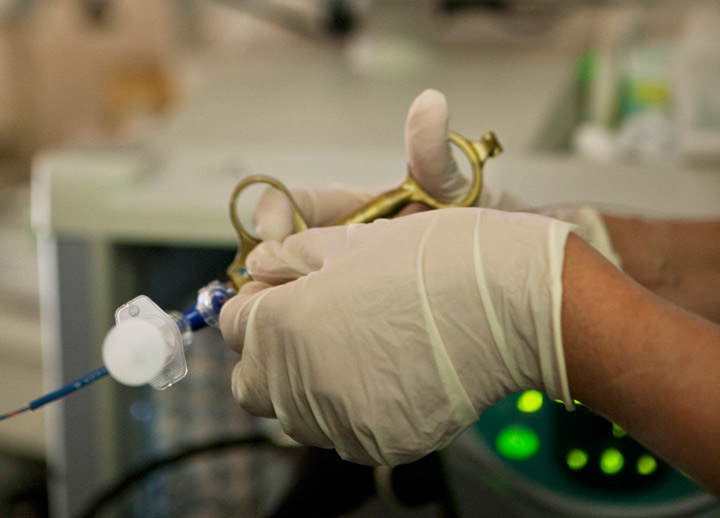HALIFAX – Officials at New Brunswick’s largest health authority deliberated for three months whether to inform the public about unsterilized biopsy forceps before finally releasing the information and advising patients to get tested for hepatitis and HIV last year.

Documents recently released under access-to-information laws outline how staff with the Horizon Health Network spent weeks trying to assess the risk to patients who may have been exposed to forceps that were not appropriately sterilized at the Miramichi Regional Hospital for 14 years.
READ MORE: N.B. health officials say unsterilized forceps used for 14 years
Emails between the health authority’s administrators indicate there was uncertainty and conflicting opinions about whether to notify patients that forceps used in colposcopies were not being steam sterilized as recommended.
In one email, the network’s chief of medical staff seeks the opinion of an infectious disease specialist in Ontario, asking if she could assess the potential exposure to pathogens.
The email from Dr. Thomas Barry explains that staff discovered on May 24 that forceps used in cervical biopsies were being disinfected with a solution.
Improper sterilization raises the possibility of exposure to hepatitis B, hepatitis C and HIV.
“We have not disclosed yet and our policy is disclosure,” Barry wrote in an email dated June 8 to Dr. Allison McGeer, a microbiologist at Mount Sinai Hospital in Toronto.
“If provided with adequate info re process as well as contacts, would you help us with a risk assessment opinion. … There is some urgency as we want to disclose.”
A few days later, Horizon CEO John McGarry asked the authority’s vice-president of clinical services whether McGeer might not see the need to inform the public.

Get daily National news
“Do you think there is any chance she might find our processes, and actual practices (time and effort) sufficient enough to avoid disclosure? We will need to be convinced that the best solution is not to simply disclose with all the assuance (sic) she has stated that risk is minuscule,” he wrote.
The health authority’s policy encourages informing patients during an event in which no harm has occurred but the potential for harm exists. Disclosure is left to “clinical and professional judgment and is determined on a case by case base,” according to the policy.
Geri Geldart, Horizon’s vice-president of clinical services, says the process of determining the risk, identifying patients, deciding what tests should be done and what information should be provided to patients is complex.
“It was a complicated situation to review and it took time to even track back what happened and how long it had been going on,” she said in an interview.
“I’m comfortable with the time it took. It would have been good if we could have done it sooner, but if we had done it sooner I’m not sure we could have answered people’s questions.”
Dr. Gordon Dow, an infectious disease consultant from the Moncton Hospital, did not feel patient notification was warranted in the days soon after the discovery because the risk of infection was low, according to a briefing note also obtained through access to information.
In the end, it was decided the information should be released publicly.
In a news conference on Aug. 28, McGarry apologized for the error and described how the unsterilized forceps were used from 1999 to 2013. He urged nearly 2,500 patients to get tested for hepatitis B, hepatitis C and HIV if they had undergone a colposcopy, a procedure used to examine the cervix, vagina and vulva to detect cervical cancer.
He also stressed that the risk of infection was extremely low, even without sterilization.
The health authority is facing a proposed class-action lawsuit over the matter, with the claimant alleging negligence and breach of contract. Alta Christine Little is also seeking damages for failing to inform patients in a timely manner of their possible exposure to disease.
Geldart said she couldn’t comment on the legal matter.
Theresa Fillatre, senior policy adviser with the Canadian Patient Safety Institute, couldn’t speak to the New Brunswick case but says it can take time to determine if there was a breakdown in the hospital’s system and how many people may have been affected.
“It is a right of the patient to know what has happened to them,” she said, adding that three months seemed a reasonable time frame.
“You don’t want to create fear in the public if there’s no need for fear, but at the same time you have to figure out when disclosure is justified.”
The health officials appear to have reviewed similar cases, like one in Toronto in 2003 in which 900 men were told to get pathogen testing after prostate-biopsy equipment was not cleaned properly. The case was reviewed in the New England Journal of Medicine, which concluded that “disclosure should be the norm, even when the probability of harm is extremely low.”
New Brunswick health officials debate disclosing safety transgression







Comments